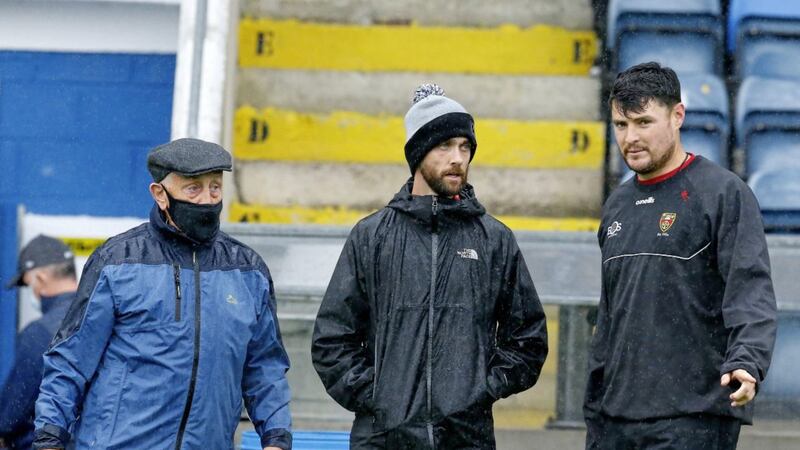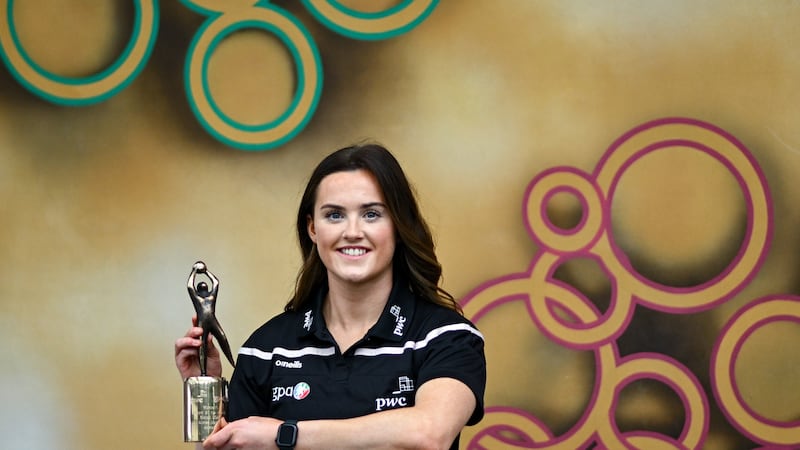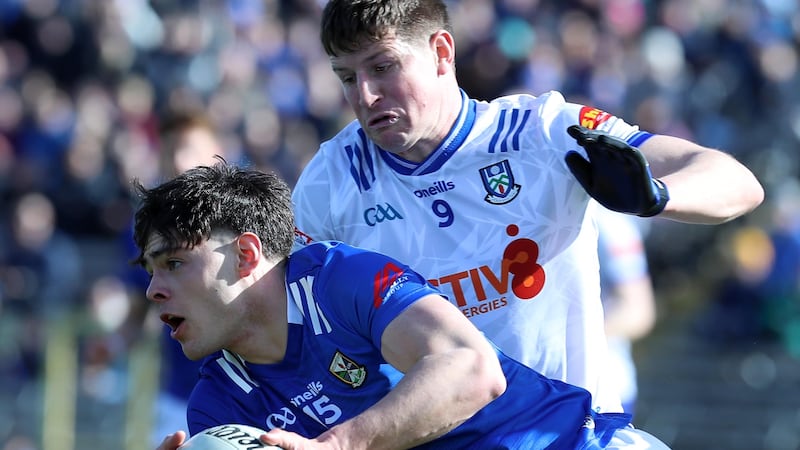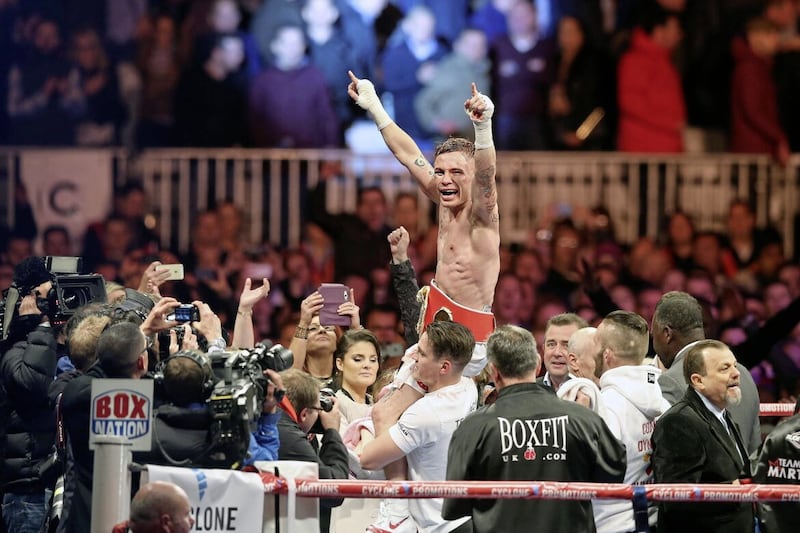WITH the summer of ’99 at its peak, the late Eugene McGee cast an eye over the following day’s provincial finals in his Irish Independent column. A man not given to mincing words, McGee – who famously led Offaly to All-Ireland glory in 1982 - homed in on a couple of contemporaries still patrolling the line.
In Leinster, Seán Boylan’s Meath were renewing their rivalry with the Dubs, while up north Down and Pete McGrath had noisy neighbours Armagh in their sights. Eight years earlier, Boylan and McGrath had come face to face on the greatest stage of all, the Mournemen upsetting the odds to bring Sam back over the border for the first time since 1968.
In his weekly column, McGee pondered the evolution of the team manager in GAA – “a direct importation from cross-channel soccer” – and the backgrounds of both men.
Boylan, then in his 17th year as manager of the Royals, was ‘the hurling man’ who had ascended to the throne in another code almost by accident; the herbalist player-whisperer who always knew how, and when, to turn the screw on those at his disposal.
McGrath’s route in was more traditional.
A teacher at St Colman’s College in Newry, and a Gaelic football diehard, he knew the players in the county like the back of his hand. For those who escaped his radar, there were sources in every corner ready to pass on information.
Just as with Boylan, though, it might not have happened. Despite leading Down to the 1987 All-Ireland minor title, 36-year-old McGrath wasn’t the first name on the list of potential successors when Jackie MacManus stepped aside – far from it.
“If there’s any truth to the rumour,” said Ross Carr, “Pete was 15th, 16th, 100th on the list…”
The rest, as they say, is history, with both delivering All-Ireland successes during a glorious period for both counties.
Contrasting fortunes greeted them the day after McGee’s piece was published, however.
While Dublin were swatted aside by a rampant Royals outfit on the way to their fourth All-Ireland crown of Boylan’s reign, Down were pulverised by an emerging Orchard.
In signing off, and perhaps suspecting the end was nigh, McGee reflected on the legacies created.
“As the two longest-serving county managers in the GAA, either or both will leave the GAA managerial system a great deal poorer when they retire.”
Eugene McGee would surely have a chuckle to himself if he knew that, 22 years on, they haven’t gone away y’know.
Last month marked 30 years since Boylan and McGrath crossed paths on the third Sunday in September, yet still the fire burns brightly for both men.
In the case of McGrath, that will come as no surprise to anybody who knows him. He has since admitted he probably should have walked after that Ulster final humbling at the hands of Armagh, instead calling time in the summer of 2002.
I remember interviewing the Rostrevor man at St Colman’s a couple of months after his 13-year stint had come to an end. The hurt was still raw. Gaelic football, and Down, mean everything to him.
Would he ever see himself back in the role? The answer might have hedged bets, but his eyes told a different tale. He looked nailed on for a return before James McCartan’s appointment in 2009 and, even in recent weeks, was mentioned as a potential part of Conor Deegan’s backroom team, should the Downpatrick man succeed Paddy Tally.
Almost four months on, Down supporters are still awaiting white smoke on that front.
In the meantime McGrath has gone through the wringer of emotions as his beloved Rostrevor, shorn of Caolan Mooney’s talismanic talents following a winter transfer to RGU, suffered relegation from Down’s senior championship less than a fortnight ago.
It was a bitter blow but, whether it is with his home club or not, perhaps even another crack at inter-county, Pete McGrath will be involved with someone, somewhere in 2022.
“It’s hard and frightening to imagine being without it, to be honest,” he said in an episode of Laochra Gael earlier this year.
“I suppose you look at what is the fabric of your life and what is the big part, the engine of your life, and it is football. Managing, being involved and having that connection with other people.
“It gives you a purpose.”
At 77 Boylan has the guts of a decade on his former adversary but, like McGrath, his passion remains undimmed.
When Meath ladies toppled Dublin to claim All-Ireland glory at the start of September, the image of an emotional Boylan – having fought his way up to the front row to embrace several members of the team – swirled around social media for days.
Just a month before that, he had stood slumped against a cold changing room wall on a sodden Saturday night at Kingspan Breffni, just minutes after the Down U20s' All-Ireland semi-final exit to Roscommon.
As he chatted to county chairman Jack Devaney, you could see what it had taken out of him. Asked onboard by Conor Laverty, it was a leftfield appointment and, especially considering how Covid-19 had given him “an awful doing” the year previous, one which merited plenty of consideration.
Within a six-day period in March 2020, Boylan dropped 10 kilos. Pneumonia took hold too as his immune system came under sustained attack. Psychologically, a man who had previously loved life now felt vulnerable, afraid.
Integrating with a group of young men, though, proved just the tonic.
“I was getting a right slagging because it’s 30 years since Down beat us in an All-Ireland final,” he laughed, “then here’s me going up the road to help me deal with what happened in 1991!”
And once he was in, there were no half measures.
Regardless of where the team trained, he was there. Often locals would get wind and mosey down for a chat, with Boylan only leaving Drumaness for Dunboyne at 11.15pm one night, two hours of road still before him.
“Seán just had so much respect for everyone he met,” said Marty Clarke, also part of Laverty’s backroom team.
“The man's character and presence made age irrelevant. Within the group, he just knew exactly what to do and say in any circumstance.
“If things were a bit low-key, he was able to come in on a motivational aspect. If Conor or I were hyping a session up a bit too much, or being a little bit hard on players, Seán would be able to calm things down as well.
“An absolute gentleman first, a pure GAA man second.”
As Eugene McGee said, the landscape will darken the day men like Seán Boylan and Pete McGrath finally decide to retire. Thankfully, that doesn’t look like being any time soon.









